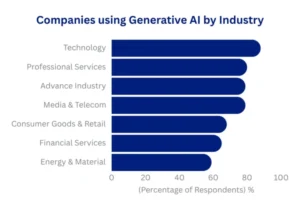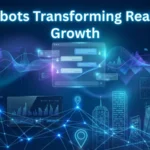The world today is experiencing one of the most impactful transitions ever—the transition of literally every sector towards artificial intelligence technology. Generative AI is playing a pivotal role in AI adoption across industries, due to its creativity and automation. Researchers found out that about 39% of the US population between the ages of 18 and 64 reported using genAI in August 2024. However, generative AI adoption is still not a full blown movement, rather a one project at a time thing for most organizations. If we speak of the time when computers and the internet were introduced, a study says that the adoption speed of generative AI is quicker than the adoption of computers or the internet.
So, it is evident that features of generative AI have made a special place in every industry, and even routine life tasks. We can see how people have started turning to generative AI platforms for basic searches rather than searching it up on Google. In this blog, we shall discuss how generative AI adoption works, the benefits of generative AI technology, and some challenges associated with its implementation.
Generative AI Adoption- A Strategic Approach
Adoption of any technology in a business organization requires much more than just the technology. A well-thought-out, calculated, and strategic plan is crucial before experimenting with your business processes. Let us discuss here a clear strategy or steps on how you can opt for Generative AI adoption in your workplace.
Define Clear Goals
It is important to understand your business goals and requirements before you start looking for solutions. Arrange a proper brainstorming session with one representative of each of your teams and jot down everything. Understand all the goals, short-term and long-term, and understand the challenges or issues associated with those goals. Then look at your solution and see how it can solve these issues. When you talk to an AI development company, tell them all about what you are expecting.
Prepare your Infrastructure
Often, legacy systems and software can not support artificial intelligence tools. It is therefore important to check and upgrade your infrastructure to be fully functional when you conduct generative AI adoption.
Build a Roadmap
For this step, consider collaborating with a generative AI development service, as they can help you build a practical, robust, and effective roadmap. They will also help you break down the whole process into phases for the ease of staying prepared with different resources.
Start with pilot projects
It is not compulsory to shift your entire workflow to generative AI technology. It is, in fact, preferable to start with one pilot project and later shift towards total automation. One pilot project prepares you well for your future projects. It also allows you to ensure that your requirements are met with the given solution.
Keep responsible Governance Ready
Once you have a generative AI tool or system implemented in the organization, the real struggle of responsibilities begins. Thus, it is important to train your staff and keep responsible leaders ready to take the lead of Generative AI-powered operations. They should ensure ethical and responsible use of AI in the organization.
Train Your Staff
If your staff will not co-operate with your new venture, it will never work out. So, book a session with some AI consulting services and get proper training for every member of the organization within the impact frame of these new changes. Every employee should receive the message that AI is not to replace them, but rather to assist them. A well-anticipated technological transformation will relatively be more successful than the one your employees fear.
See how generative AI benefits businesses across industries- Get a custom strategy for AI adoption in your business.
Benefits of Generative AI Adoption
Generative AI adoption in every sector boosts productivity, performs tasks more precisely, efficiently, and quickly, compared to manual work. Let us navigate through some major benefits of generative AI tools and technology.
-
Enhanced Efficiency
Generative AI adoption comes with the default benefit of an increase in efficiency. The genAI takes care of tedious, time-consuming, and repetitive tasks. This ensures time saving, quick task completion, and fewer or negligible errors compared to humans. Overall, efficiency of the workplace certainly rises, providing more productivity in less time, with fewer errors and lower labour costs.
-
Innovation and Creativity
Generative AI tools depend on large language models for their learning data. They learn from such large language models and provide innovative, novel, and creative designs or solutions for marketing campaigns. This enables business owners to innovate frequently and stay ahead of the competition in the market.
-
Data-Driven Decision Making
Generative AI’s data analysis helps businesses track their activities through well-organized dashboards and reports. It also provides insightful reports that stakeholders can evaluate to make well-informed decisions. These decisions being backed by evidence-based data, are more practical and impactful.
-
Industrial Automation
Generative AI is capable of bringing industrial automation to several repetitive processes. It does so by observing the pattern and then mimicking human behavior to get it done. During its learning, it also establishes a standard of normalcy and refrains from deviation to avoid mistakes. These tasks can be as simple as data entry and document scanning to as dangerous as temperature supervision in chemical reactors. Generative AI adoption helps bring industrial automation to almost every industry in one or another process.
-
Personalization and Customization
One of the most interesting generative AI use cases is customization and personalization. Be it for marketing campaigns, customer product orders, or personalized interactions through any of the channels. Generative AI technology tracks customer data, remembers their preferences, and classifies them in segments to direct marketing campaigns separately for each segment. Such personalized marketing strategies are more likely to convert.
-
Future Proofing
While most businesses are shifting towards AI implementation in their workflows, it is not wrong to say that our economic future is also shaped by artificial intelligence. In this highly competitive economy, it is important to stay relevant to the modern age customers. Thus, generative AI adoption is not just a profitable step but a need of the hour. Use of generative AI ensures that your business becomes future-ready.

Challenges With Generative AI Adoption
Along with new technological advancements come the challenges of implementing them. The obvious challenges with artificial intelligence are data biases and other ethical concerns. Knowing and staying prepared for these challenges is important when you plan generative AI adoption in your organization. Some of the common issues associated with GenAI implementation include:
-
Data Quality and Biases
As generative AI depends on a large amount of data for its functioning, any kind of problems with the data it is trained on may result in inconsistencies or biases. Thus, it is important to use quality data for AI training and ensure that it is not biased.
-
Data Privacy and Security
When a tool has access to all your customer data as well as organizational data, then data security is also a valid concern. This concern can be resolved using trusted AI development partners or platforms that prioritize security. There are encryptions, multilayered security, and other options available to keep your data safe from any breaches.
-
Integration Difficulties
Generative AI, being one of the most advanced technologies, sometimes doesn’t integrate easily with traditional systems and software. To avoid facing such a situation, make sure your office infrastructure is ready for AI integration during the planning phase itself.
-
Lack of Skilled Professionals
As the AI field is evolving and quite recent, skilled and experienced professionals to help with AI integration are hard to find. AnavClouds Analytics.ai has a team of experienced AI experts who can help your business leverage generative AI for growth easily.
-
Resistance to Change
This is a frequent concern with new changes in the workplace, as there are always people who are resistant to change. In case of AI, there’s enough fear-mongering on social media about AI taking over jobs, so some resistance to AI is understandable as well. It is necessary to prepare your staff for the change and tell them how AI can assist them rather than take over their job.
-
Ethical Concerns
With AI automating some of the repetitive tasks and making innovative designs in companies, there are ethical concerns about who is the owner of the design. Other concerns are regarding the responsible use of AI in the organization. This can be settled with a responsible team assigned to ensure the correct use of AI on the premises.
Conclusion
Generative AI adoption is not an easy decision, but not a difficult one either. With AnavClouds Analytics.ai, business owners can simply book a consultation session with AI experts and understand the scope of AI in their organization. Our team of dedicated experts will ensure smooth deployments of AI tools that can transform your business. Brace yourself for the AI-powered future, and rest assured, as you will have your business future ready with us. Book a demo with us today!
FAQs
What are the strategies for Generative AI implementation?
Some important things to pay attention to while creating strategies for generative AI implementation are business alignment, maturity assessment, technical infrastructure, data governance, and talent optimization.
What is the main goal of Generative AI technology?
The main goal of generative AI technology is to study patterns in the existing data and create novel content that was only possible with human intelligence previously.
Which platform is best for generative AI?
The best platform for generative AI is AWS (Amazon Web Services). It offers generative AI customization that suits your industry’s use cases and desired features, with enterprise-level security.
What is the key feature of generative AI?
The key feature of generative AI is its capacity to mimic human brain functioning and create content like humans.
What is the biggest challenge regarding AI adoption?
The biggest challenge regarding AI adoption is data security. This is because artificial intelligence tools are trained on data as well as perform their tasks with data. With access to so much data, concern regarding data security is valid.



